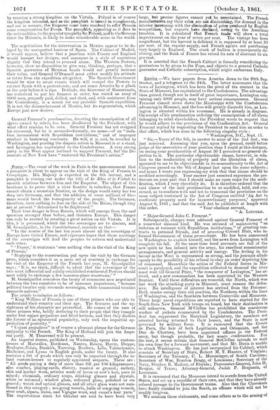c 'rams.—The event of the week in Paris is the announcement
that a pamphlet is about to appear on the visit of the King of Prussia to Compiegne. His Majesty is expected on the 6th instant, and a pamphlet is coming out under the title of Le Rhin et la Vistale to smooth relations between him and the Emperor. The object of this brochure is to prove that a river frontier is valueless, that France cannot obtain a mountain frontier, as the design would carry her too deep into Germany, and that the addition of some millions of Ger- mans would break the homogeneity of the people. The Germans, therefore, have nothing to fear on the side of the Rhine, though they arc at present " determined to be frightened." Their true danger is from Russia, which will emerge from the serf question stronger than before, and threaten Europe. This danger can only be averted by creating a great nation on the Vistula. It this, it is presumed, which the two sovereigns are to discuss, and M. Grandguillot, in the Constitationnel, reminds us that-
" In the course of the last ten years almost all the sovereigns of Europe have visited France, and expresses hopes that these meetings of the sovereigns will lead the peoples to esteem and understand each other.
" 'France,' it continues sees nothing else in the visit of the King of Prussia.'
" Replying to the construction put upon the visit by the German press, which considers it as a mere act of courtesy in exchange for the visit of the Emperor of the French last year, M. Grandguillot says : ' It is, we think, difficult to admit that the sovereigns of the two most influential and solidly established continental Powers should meet solely to exchange a few common-place courtesies.' " M. Grandguillot considers the treaty of commerce now negotiated between the two countries to be of immense importance, "because political treaties only reconcile sovereigns, while commercial treaties reconcile nations."
The article terminates as follows : " King William of Prussia is one of those princes who are able to understand their country and their age. The firmness and the up- rightness of his character are proverbial. He comes of the race of those princes who, boldly declaring to their people that they trample under foot unjust prejudices and blind hatreds, and that they disdain the favour of an ephemeral popularity, only seek the impartial ap- probation of posterity." "Unjust prejudices" is of course a pleasant phrase for the German antipathy to the French. The King of Holland will join the Impe- rial party. M. Thouvenel will be present.
An imperial decree, published on Wednesday, opens the custom- houses of Marseilles, -Bordeaux, Nantes, Rouen, Havre, Dieppe, Boulogne, Calais, Dunkirk, Turcoing, Roubaix, Lille, Valenciennes, Mulhouse, and Lyons to English goods, under the treaty. It also contains a list of goods which can only be imported through the in- land custom-houses or regularly appointed seaports. These are : " All goods paying a duty of more than 20f. per 100 kilogranunes ; also coaches, playing-cards, chicory, roasted or ground; cutlery, skin and leather work, articles made of horse or cow's hair, pure or mixed; chemicals, ordinary soaps, drinking glasses and crystals, white or coloured ; window glass, coloured glass, polished or en- graved ; watch and optical glasses, and all other glass ware not men- tioned in this catessory ; sea-going vessels, hulls of sea-going vessels, river craft, alpaca, llama, and Vigogne wool, and camel's hair yarn." The importations since 1st October are said to have been very large, but precise figures cannot yeti be ascertained. The French manufacturers say their sales are not diminishing, the demand in the interior increasing with the diminution of price produced by English competition, but exports have declined, owing to the American troubles. It is calculated that French trade will show a total improvement on the year of seven per cent. The vintage has been magnificent, but the harvest is deficient it is supposed by at least 30 per cent. of the regular supply, and French agents are purchasing very largely in England. The stock of bullion is consequently de- clining, and. the Bank of France has raised its rate of discount to six per cent.
It is asserted that the French Cabinet is formally considering the guarantees to be given to the Pope, and objects to a general Catholic guarantee and Catholic subscription, which might embarrass Italy.






























 Previous page
Previous page